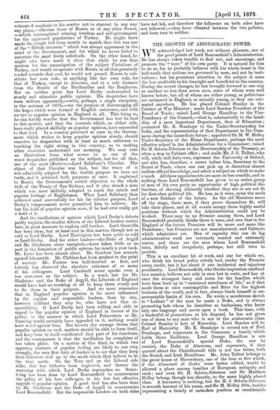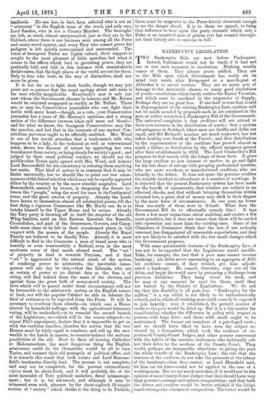THE GROWTH OF ARISTOCRATIC POWER.
WE acknowledged last week, not without pleasure, one of the good points of Lord Beaconsfield's Administration. He has always taken trouble to find out, and encourage, and promote the " boys " of his own party. It is natural for him to do so, for he probably believes with his whole heart in the half-truth that nations are governed by men, and not by insti- tutions; but his persistent attention to the subject is none the less creditable to his foresight and beneficial to the country. During the recent changes, he has brought forward in one way or another no less than seven men, some of whom were well known before, but all of whom are either young, as politicians are estimated in England, or actually young, as they are esti- mated anywhere. He has placed Colonel Stanley in the Cabinet as War Minister ; made Lord Sandon President of the Board of Trade ; raised Lord George Hamilton to the Vice- Presidency of the Council,—that is, substantially to the head- ship of a most important Department, that of Education ; promoted Mr. E. Stanhope to the Under-Secretaryship for India, and the representation of that Department in the Com- mons during the immediate future ; appointed Sir M. W. Ridley Under-Secretary of the Home Department, perhaps the most effective school in the Administration for a Commoner; raised Sir H. Selwin-Ibbetson to the Secretaryship of the Treasury, so often a step to Cabinet office ; and made Mr. J. G. Talbot, who will, while still forty-two, represent the University of Oxford, and who has, therefore, a career before him, Secretary to the Board of Trade, where one can pick up at discretion almost endless official knowledge, and select a subject on which to make a mark. All these appointments are more or less sensible, and in making them Lord Beaconsfield has given to an entire group of men of his own party an opportunity of high political dis- tinction, of showing distinctly whether they are or are not fit for first-class political life. He has, as it were, sown the seeds of a new Cabinet of the future. As the old Ministers move off the stage, these men, if they prove themselves fit, will take their places, and at all events occupy those highly useful positions without which the Administration could not be worked. There may be no Premier among them, and Lord Beaconsfield probably thinks there is none, and sees that in the England of the future Premiers will be more and more like Presidents ; but Premiers are not manufactured, and Cabinets which administer are. Men of capacity who can do big administrative work are extremely wanted and extremely scarce, and these are the men whom Lord Beaconsfield tries, fitfully and irregularly, perhaps, but still tries to provide.
This is an excellent bit of work, and one for which we, who think his broad policy utterly bad, render the Premier every credit, but it has about it one incidental and injurious peculiarity. Lord Beaconsfield, who thinks inspiration confined to a country, believes not only in race but in caste, and has at once the strangest fancy and scorn for the families which have been bred up in "sustained stateliness of life," as if that made them at once contemptible and fitter for the highest business of the world, and in fact, always binds himself in un- accountable limits of his own. He wrote a murderous sketch in " Lothair " of the man he made a Duke, and is always promoting lads whom he describes as barbarians, who know only one language and never open a book. This time, with a bucketful of promotions at his disposal, he has not given one of them to any man who is not of the aristocratic class. Colonel Stanley is heir of Knowsley. Lord Bandon will be Earl of Harrowby. Mr. E. Stanhope is second son of Earl Stanhope, and represents in the Commons a family which holds three Earldoms. Lord George Hamilton is son of Lord Beaconsfield's special Duke, the one he created, the Duke of Abercorn, and represents, if that quarrel about the Chatelherault title is not too bitter, both the Scotch and Irish Hamiltons. Mr. John Talbot belongs to the great house of Shrewsbury, one of the four or five which, if the Almanaeh de Gotha were better edited, would be allowed a place among families of European antiquity and rank ; and even Sir H. Selwin-Ibbetson and Sir Matthew Ridley belong, though less directly, to the same highly placed class. A baronetcy is nothing, but Sir H. J. Selwin-Ibbetson is seventh baronet of his name, and Sir M. Ridley fifth, besides representing a family of unbroken position as considerable landlords. No one has, in fact, been selected who is not an " aristocrat " in the English sense of the word, and only one, Lord Bandon, who is not a County Member. The boroughs are left, as usual, almost unrepresented, just as they are in the Cabinet, where there is one business man among all the Peers and many-acred squires, and every Tory who cannot prove his pedigree is left quietly unrecognised and unrewarded. The votes of bourgeois Tories are highly valued, their support is sought by the most pleasant of little speeches, but when it comes to the offices which lead to governing power, they are pratically told, and told in this instance with unmistakable decisiveness, that the high places of the world are not for them. Only to him who hath, in the way of distinction, shall any more be given.
It is not for us to fight their battle, though we may just point out en passant that the usual apology about safe seats is for once wholly inapplicable. Everybody's seat is safe just now whom the Government chooses to honour, and Mr. Brown would be returned unopposed as readily as Mr. Talbot. There axe, or may be, Conservative journalists who can fight their battle with more heart—though, as a rule, your Conservative journalist has a trace of Mr. Hannay's opinions, and a strong notion of the difference between ichor and mere red blood— and for what we know, the bourgeois Conservatives may like the practice, and feel that in the interests of our ancient Con- stitution parvenus ought to be officially snubbed. Mrs. Wood in one of her novels preaches that a tradesman's wife who happens to be a lady, in the technical as well as conventional sense, shows her fineness of nature by approving her own banishment from society, as being clearly for society's good ; and judged by their usual political conduct, we should say the middle-class Tories quite agreed with Mrs. Wood, and honour Lord Beaconsfield for his consistency in refusing them anything but snubs. That kind of nature is so common that it may be theirs universally, but we should like to point out two conse- quences of this line of selection which may not be equally approved either by the country or by the more sensible magnates. Lord Beaconsfield, assisted by events, is deepening the fissure be- tween the "people," using the word for once in its Continental sense, and the great owners of property. Already the Lords have drawn to themselves almost all substantial power, till the best thing a vigorous Commoner like Mr. Hardy can do is to betake himself to the Upper House and be secure. Already the Tory party is drawing off to itself the stupider of the old Whig families, until on this Eastern Question the Russells, Cavendishes, and part of the Grosvenors, Gowers, and Camp- bells seem alone to be left in their accustomed place, in full rapport with the masses of the people. Already the Royal Family are believed to be fixedly Tory. Already it is most difficult to find in the Commons a man of broad acres who is heartily or even trustworthily a Radical, even in the most moderate sense of that much abused word. The " set " of property in land is towards Toryism, and if that " set " is aggravated by the natural result of the system of confining power to aristocrats, the inevitable conse- quence will one day be this,—that the Liberals, who are as certain of power at no distant date as the Sun is of rising, will find behind them the mass of the electors, and against them the great bulk of many-acred society. The laws which will be passed under those circumstances will not be favourable to the aristocratic system or the English tenure of land, nor will the popular Cabinet be able to tolerate the kind of resistance to be expected from the Peers. It will be necessary to overbear them silently—in which case a House elected by household suffrage, with the agricultural labourers voting, will be unchecked—or to remodel the second branch of the Legislature, or—which will be the course adopted—to repeat Pitt's experiment, declare that it is impossible to get on with the coalition families, abandon the notion that the two Houses must be fairly equal in numbers, and call up the new wealth to the Lords in masses, to counter-balance the uniform proclivities of the old. Next to their all turning Catholics or Mahommedans, the most dangerous thing the English aristocracy could do for themselves would be all to turn Tories, and reassert their old monopoly of political office, and it is towards this result that both events and Lord Beacons- field's tendencies directly lead. The process is not complete, and may not be completed, for the present extraordinary regime must be short-lived, and it will probably die of the most incurable of Tory political maladies, fiscal mismanage- ment; but it is far advanced, and although it may be witnessed even with pleasure by the short-sighted, ill-taught section of " society " which thinks it the thing to be Turkish, there must be magnates in the Peers keenly observant enough to see the danger ahead. It is to them we appeal, to bring that influence to bear upon the party counsels which only a Duke or an imported man of genius ever has seemed through- out their history able to exercise in full.



































 Previous page
Previous page